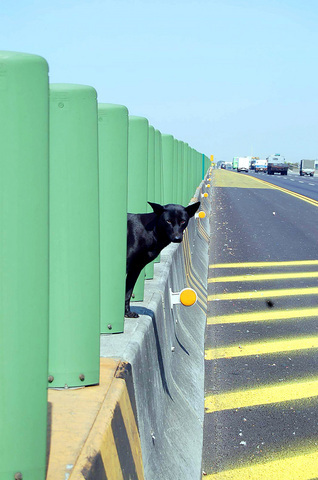Over two years ago, a black stray dog wandered onto the Sun Yat-sen Freeway and has lived ever since on the central island of the freeway, under bad conditions, perhaps because it dares not cross the busy road again.
The medium-sized dog lives on the central island between Changhua Interchange and Yuanlin Toll Station in central Taiwan.
The dog lives on food thrown at it by drivers. Since the place is located at the 209th kilometer of the freeway, local police have called the dog "209," while reporters at National Traffic Network of the Police radio station call it the "dog of Changhua."

PHOTO: YEN HUNG-CHUN, TAIPEI TIMES
"I bet it is the stray dog that has survived the longest on a freeway island," said a driver surnamed Yen (
Yen first noticed "209" on a rainy morning over two years ago and he saw it again at the same location the next day.
Nobody knows exactly where "209" is from.
Local police said that it usually lingers on the 1m-wide island between Changhua Interchange, located at the 200th kilometer of the freeway, and Yuanlin Toll Station, at the 216th kilometer of the freeway.
Numerous drivers called Police Radio Station to show their concern, and "209" became famous.
A woman surnamed Lai (
Lai said that she feels happy whenever she sees "209," because it is good to know that the dog is still alive. She hopes it will be leave the freeway someday, because a wide and beautiful world is waiting for it on the other side of the road, she said.
Local police said that "209" mostly waits for food around the 209th kilometer of the freeway between 7am and 9am when drivers go to work and between 4pm and 6pm when they go off work.
It is a miracle that "209" has survived under such difficult conditions, they added.
In response to the case, workers from Taichung Universal Animal Protection Association said they would provide necessary tools and assistance to local police to move "209" from the island.

‘DENIAL DEFENSE’: The US would increase its military presence with uncrewed ships, and submarines, while boosting defense in the Indo-Pacific, a Pete Hegseth memo said The US is reorienting its military strategy to focus primarily on deterring a potential Chinese invasion of Taiwan, a memo signed by US Secretary of Defense Pete Hegseth showed. The memo also called on Taiwan to increase its defense spending. The document, known as the “Interim National Defense Strategic Guidance,” was distributed this month and detailed the national defense plans of US President Donald Trump’s administration, an article in the Washington Post said on Saturday. It outlines how the US can prepare for a potential war with China and defend itself from threats in the “near abroad,” including Greenland and the Panama

The Chinese Nationalist Party (KMT) is maintaining close ties with Beijing, the Democratic Progressive Party (DPP) said yesterday, hours after a new round of Chinese military drills in the Taiwan Strait began. Political parties in a democracy have a responsibility to be loyal to the nation and defend its sovereignty, DPP spokesman Justin Wu (吳崢) told a news conference in Taipei. His comments came hours after Beijing announced via Chinese state media that the Chinese People’s Liberation Army’s Eastern Theater Command was holding large-scale drills simulating a multi-pronged attack on Taiwan. Contrary to the KMT’s claims that it is staunchly anti-communist, KMT Deputy

RESPONSE: The government would investigate incidents of Taiwanese entertainers in China promoting CCP propaganda online in contravention of the law, the source said Taiwanese entertainers living in China who are found to have contravened cross-strait regulations or collaborated with the Chinese Communist Party (CCP) could be subject to fines, a source said on Sunday. Several Taiwanese entertainers have posted on the social media platform Sina Weibo saying that Taiwan “must be returned” to China, and sharing news articles from Chinese state media. In response, the Mainland Affairs Council (MAC) has asked the Ministry of Culture to investigate whether the entertainers had contravened any laws, and asked for them to be questioned upon their return to Taiwan, an official familiar with the matter said. To curb repeated

Taiwan People’s Party (TPP) Chairman Huang Kuo-chang (黃國昌) yesterday appealed to the authorities to release former Taipei mayor Ko Wen-je (柯文哲) from pretrial detention amid conflicting reports about his health. The TPP at a news conference on Thursday said that Ko should be released to a hospital for treatment, adding that he has blood in his urine and had spells of pain and nausea followed by vomiting over the past three months. Hsieh Yen-yau (謝炎堯), a retired professor of internal medicine and Ko’s former teacher, said that Ko’s symptoms aligned with gallstones, kidney inflammation and potentially dangerous heart conditions. Ko, charged with